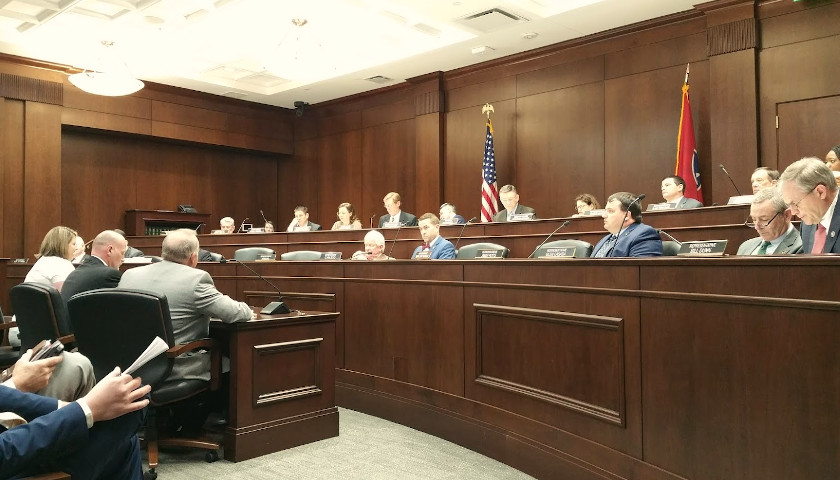NASHVILLE, Tennessee – The state Senate and House Transportation committees each advanced legislation Wednesday to address Tennessee’s unconstitutional Billboard Regulation and Control Act of 1972.
The Act was ruled unconstitutional by the United States Court of Appeals for the Sixth Circuit on September 11, 2019, as The Tennessee Star reported.
The court based its opinion on the Act’s content-based restriction of non-commercial free speech relative to billboards that are located off-premises of a business. The permit process and regulations of the Act are the responsibility of the Tennessee Department of Transportation (TDOT).
The case goes back to 2006, when William Harold Thomas, Jr., owner of over 30 billboards in Tennessee, applied to TDOT for a permit on a vacant lot for commercial advertisement. TDOT denied the permit application due to spacing issues, but Thomas constructed the billboard and put up his sign anyway.
TDOT sued Thomas in state court, claiming that Thomas violated the Billboard Act.
The case went back and forth for several years, finally landing in the Sixth Circuit Court of Appeals, which found in favor of Thomas.
Included in the Sixth Circuit Court’s opinion was the trial court finding that there was “substantial evidence of selective and vindictive enforcement” against Thomas by TDOT.
Apparently, TDOT employees worked with Thomas’ competitor to “defeat” him and sent unsolicited emails to Thomas’ advertising customers, suggesting that his billboards were illegal and that associating with Thomas would reflect “negatively” on them.
Since the September 2019 ruling, TDOT has suspended the billboard permitting process and enforcement of regulations within Tennessee’s Billboard Regulation and Control Act of 1972, which mirrors that of Congress’ 1965 Federal Highway Beautification Act (HBA). In that time, it is estimated at least 50 billboards have been put up without TDOT approval.
By mirroring and complying with the HBA in maintaining effective control of signs within 660 feet of an interstate or primary highway, Tennessee is assured of full federal highway funding, of which 10 percent is tied to the Billboard Act.
By not having HBA compliant regulations and enforcing them, $93 million in Federal highway funding is at risk.
In January, both the Senate and House transportation committees heard testimony from a panel of stakeholders including the Tennessee Office of the Attorney General and Reporter, TDOT, the Outdoor Advertising Association of America and Scenic Tennessee, The Star reported.
Wednesday, the Senate and House took up the proposed legislation in their separate transportation committees under SB 2188 and HB 2255, respectively, presented by committee chairs Senator Becky Massey (R-Knoxville) and Representative Dan Howell (R-Georgetown).
The original bill language was developed by TDOT, but two amendments were offered by the committee chairs that were supported by the outdoor advertising industry.
After the amendments were presented by the committee chairs, the committees then heard from Kerry Yoakum, Vice President of Government Affairs for the Outdoor Advertising Association of America (OAAA) and former billboard regulator for Ohio’s Department of Transportation, Holly Kirby of Johnson, Poss, Kirby Government Relations and Dave Roland of Roland Digital Media, representing the outdoor advertising industry as well as TDOT’s Deputy Commissioner and Chief Engineer Paul Degges and Brian Carroll, Legislative Director and Legal Counsel.
Roland’s digital billboard business is based in Cookeville, where last week an EF-4 claimed 18 lives and damaged hundreds of structures.
Roland took his time speaking to hold up for House Transportation Committee members some pictures of the digital billboards he displayed as public service announcements in the wake of the tornado, as The Star reported, as well as pictures taken during President Trump’s visit last week to survey the damage and visit with victims.
He got a bit emotional as he expressed appreciation for all the support given to those who suffered such tremendous losses.
Both committee rooms had a fair amount of observers from the outdoor advertising industry as well as Governor Bill Lee appointed TDOT Commissioner Clay Bright along with Deputy Commissioner/Chief of Staff Lyndsay Botts, who attended both committee meetings, although neither testified.
In their introductions, the committee chairs shared with their members the background and highlights of the proposed amendments that make the legislation.
A key element is that off premises signs are renamed as outdoor advertising and are defined as those for which there is “compensation,” replacing the content-based review struck down by the Sixth Circuit Court.
Criminal penalties for illegal billboards are replaced in the legislation with a civil penalty up to $100 per day with a maximum of $3,000 per year, imposed at the discretion of the Commissioner of TDOT.
TDOT’s Deputy Commissioner and Chief Engineer Paul Degges questioned whether such a low threshold would serve as an effective deterrent.
TDOT also expressed concern that the amendments, containing language the industry supported but TDOT does not, put $93 million in Federal highway funding at risk.
OAAA’s Yoakum said Tennessee’s proposed legislation was modeled after Texas, which was modeled after Oregon and neither has been challenged since being enacted.
Yoakum said that as a former regulator and in his current job, he sees a serious threat of effective control under TDOT’s version and that he would be coming back to lobby with a smug look on his face, saying, “I told you so.”
Bottom line, Yoakum said that the potential loss of $93 million in Federal highway funding that TDOT repeatedly mentioned is “a hollow threat.”
Both committees, after lengthy debate, went on to approve the amended bills.
SB 2188 was referred to the Senate Calendar Committee for scheduling on the Senate floor.
HB 2255 was referred to the House Finance, Ways and Means Committee.
Laura Baigert is a senior reporter at The Tennessee Star.





